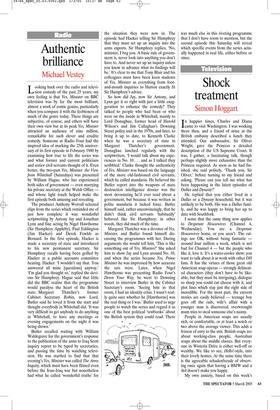Authentic brilliance
Michael Vestey
Looking back over the radio and televi sion comedy of the past 25 years, my own feeling is that Yes, Minister on BBC television was by far the most brilliant, almost a work of comic genius, particularly when you compare it with the feebleness of much of the genre today. These things are subjective, of course, and others will have their own view but at its peak Yes, Minister attracted an audience of nine million, remarkable for such clever and erudite comedy. Someone at Radio Four had the inspired idea of marking the 25th anniversary of its first episode in February 1980 by examining how true to life the series was and what former and current politicians and senior civil servants thought of it. Even better, the two-part Yes, Minister: the View from Whitehall (Saturdays) was presented by William Hague, who has experienced both sides of government — even marrying his private secretary at the Welsh Office and whose light touch helped make the first episode both amusing and revealing.
The producer Anthony Worrall selected clips from the series which reminded me of just how complete it was: wonderful scriptwriting by Antony Jay and Jonathan Lynn and fine acting by Nigel Hawthorne (Sir Humphrey Appleby), Paul Eddington (Jim Hacker) and Derek Fowlds as Bernard. In the first episode, Hacker is made a secretary of state and introduced to his new permanent secretary. Sir Humphrey recalls having been grilled by Hacker at a public accounts committee hearing. Hacker: ‘I wouldn’t say that. You answered all mine [questions] anyway.’ ‘I’m glad you thought so,’ replied the devious Sir Humphrey. Hague said that little did the BBC realise that the programme would paralyse the heart of the British state. Margaret Thatcher’s former Cabinet Secretary Robin, now Lord, Butler said he loved it from the start and thought everybody in Whitehall did. ‘It was very difficult to get anybody to do anything in Whitehall, to have any meetings or evening engagements on the night it was being shown.’ Butler recalled waiting with William Waldegrave for the government’s response to the publication of the arms to Iraq Scott inquiry report to be typed by secretaries, and passing the time by watching television. He was startled to find that that evening’s Yes, Minister was called The Arms Inquiry, which must have been filmed even before the Iran–Iraq war but nonetheless had what he called ‘wonderful truths’ for the situation they were now in. The episode had Hacker telling Sir Humphrey that they must set up an inquiry into the arms exports. Sir Humphrey replies, ‘No, minister, I beg you. A basic rule of government is, never look into anything you don’t have to. And never set up an inquiry unless you know in advance what its findings will be.’ It’s clear to me that Tony Blair and his colleagues must have been keen students of Yes, Minister as everything from footand-mouth inquiries to Hutton exactly fit Sir Humphrey’s advice.
So how did Jay, now Sir Antony, and Lynn get it so right with just a little exaggeration to enhance the comedy? They talked to people who had been or who were on the inside in Whitehall, mainly to Lord Donaghue, former head of Harold Wilson’s and Jim Callaghan’s Downing Street policy unit in the 1970s, and later, to bring it up to date, to Kenneth Clarke when he was a secretary of state in Margaret Thatcher’s government. Donaghue lunched regularly with the scriptwriters. ‘I would talk about my experiences in No. 10 ... and as I talked they scribbled.’ Clarke thought the authenticity of Yes, Minister was based on the language of the more old-fashioned civil servants, which he called mandarin. He believed the Butler report into the weapons of mass destruction intelligence dossier was the most devastating he’d ever read about a government, but because it was written in polite mandarin it lacked force. Butler himself said, rather unconvincingly, that he didn’t think civil servants ‘habitually’ behaved like Sir Humphrey; in other words, they did much of the time.
Margaret Thatcher was a devotee of Yes, Minister, and Butler found himself discussing the programmes with her. During arguments she would tell him, ‘This is like something out of Yes, Minister!’ She asked him to show Jay and Lynn around No. 10, and when the series became Yes, Prime Minister he was impressed by how accurate the sets were. Later, when Nigel Hawthorne was presenting Radio Four’s Down Your Way, he went to Downing Street to interview Butler in the Cabinet Secretary’s room. ‘Seeing him in that room, I had an identity crisis. I wasn’t really quite sure whether he [Hawthorne] was the real thing or I was.’ Butler used to urge people to watch the series and regard it as one of the best political ‘textbooks’ about the British system they could read. There was much else in this riveting programme that I don’t have room to mention, but the second episode this Saturday will reveal which specific events from the series actually happened in real life, either before or since.


























































 Previous page
Previous page